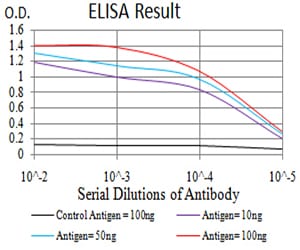
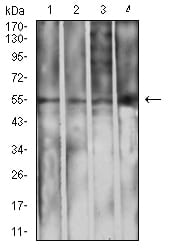
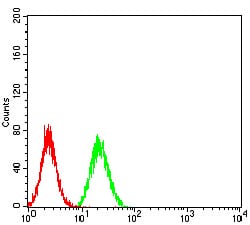
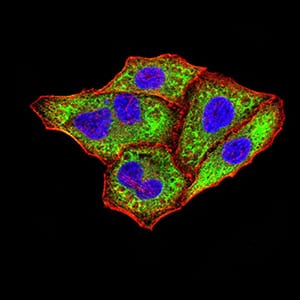
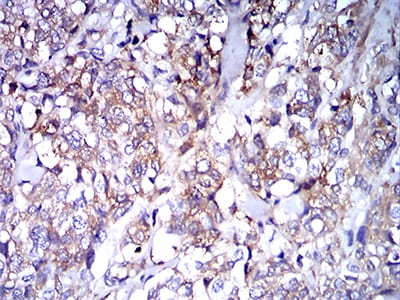
| WB | 咨询技术 | Human,Mouse,Monkey |
| IF | 咨询技术 | Human,Mouse,Monkey |
| IHC | 1/200 - 1/1000 | Human,Mouse,Monkey |
| ICC | 1/50 - 1/250 | Human,Mouse,Monkey |
| FCM | 1/200 - 1/400 | Human,Mouse,Monkey |
| Elisa | 1/10000 | Human,Mouse,Monkey |
| Aliases | IgA1 |
| Entrez GeneID | 3493 |
| clone | 7D5F12 |
| WB Predicted band size | 37.6kDa |
| Host/Isotype | Mouse IgG1 |
| Antibody Type | Primary antibody |
| Storage | Store at 4°C short term. Aliquot and store at -20°C long term. Avoid freeze/thaw cycles. |
| Species Reactivity | Human,Mouse,Monkey |
| Immunogen | Purified recombinant fragment of human IghA1 (AA: 207-353) expressed in E. Coli. |
| Formulation | Purified antibody in PBS with 0.05% sodium azide |
+ +
以下是关于IgA1抗体的3篇参考文献示例(注:IgA1为常见拼写,IghA1可能为笔误或特定变体):
1. **文献名称**: "Autoantibodies against IgA1 glycans in the serum of patients with IgA nephropathy"
**作者**: Tomana, M., et al.
**摘要**: 研究分析了IgA肾病患者的血清,发现其含有针对IgA1铰链区O-糖基化异常的自体抗体,这些抗体可能参与肾小球免疫复合物沉积,导致疾病进展。
2. **文献名称**: "The role of aberrant IgA1 glycosylation in the pathogenesis of IgA nephropathy"
**作者**: Novak, J., et al.
**摘要**: 探讨了IgA1分子糖基化缺陷如何被自身抗体识别,形成循环免疫复合物,并沉积于肾脏,阐明了IgA肾病中自身免疫反应的分子机制。
3. **文献名称**: "IgA1 protease production by Streptococcus pneumoniae promotes immune evasion by cleaving human IgA1"
**作者**: Kerr, M.A., et al.
**摘要**: 揭示了肺炎链球菌通过分泌IgA1蛋白酶切割宿主IgA1抗体,破坏其免疫功能,从而逃避免疫系统攻击的机制,为抗感染治疗提供新靶点。
注:若需特定领域(如肿瘤、自身免疫病)文献,可进一步补充关键词调整检索。
The IghA1 antibody is a reagent targeting immunoglobulin A1 (IgA1), a subclass of IgA antibodies critical in mucosal immunity. IgA1. predominantly found in serum and mucosal secretions (e.g., saliva, respiratory/gastrointestinal tracts), plays a role in neutralizing pathogens and maintaining immune homeostasis. Structurally, IgA1 differs from IgA2 by an extended hinge region rich in proline and O-glycosylation sites, making it susceptible to cleavage by bacterial proteases—a mechanism pathogens exploit to evade immune detection.
IghA1 antibodies are tools for studying IgA1-specific functions and pathologies. They detect IgA1 in assays, aiding research on IgA nephropathy (IgAN), a kidney disorder linked to galactose-deficient IgA1 immune complexes. These antibodies also help characterize IgA1-producing plasma cell malignancies (e.g., multiple myeloma) and immune deficiencies. Monoclonal IghA1 antibodies are generated via hybridoma or recombinant technologies, often targeting the IgA1 heavy chain or unique epitopes in the hinge region.
Their applications extend to diagnostics, such as quantifying IgA1 in autoimmune or infectious diseases, and therapeutics, including blocking pathogenic IgA1 in IgAN. However, challenges include cross-reactivity with IgA2 or other immunoglobulins, requiring rigorous validation. Overall, IghA1 antibodies remain vital for dissecting IgA1 biology and developing targeted clinical interventions.
(Word count: 200)
×